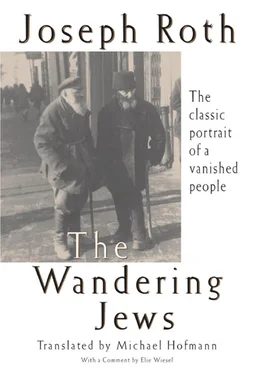In Western Europe, anti-Semitism was a private reflex. In the Christian Middle Ages, it was a facet of religious fanaticism. In Russia anti-Semitism was a pillar of government. The simple peasant, the muzhik , was not anti-Semitic. The Jew was not a friend to him, but a stranger. Russia, which had so much room for strangers, was also open to them. In contrast, it was the half-educated and the middle classes who were anti-Semites, who became so because the nobility was. The nobility was because the court was. The court was because the czar, for whom it was not acceptable to fear his own Orthodox “children,” could only claim to be afraid of the Jews. Characteristics were therefore ascribed to them that made them appear dangerous to every class: To the simple “man of the people” they were ritual murderers; to the small landowner they were destroyers of property; to the senior official they were common swindlers; to the nobility, clever — and therefore dangerous — serfs; and finally, to the bureaucrat, the quintessential petty official, they were ritual murderers, hucksters, revolutionaries, and plebeians — everything rolled into one.
The eighteenth century brought with it the emancipation of the Jews in Western countries. State-legitimized anti-Semitism only began in the next century in Russia. Plehve, later to be minister,* organized the first pogroms in southern Russia in 1881–82. They were intended to intimidate young Jewish revolutionaries. But the hired crowds, less interested in the avenging of past acts of terror than in the collecting of booty, ransacked the houses of wealthy conservative Jews, who were not the intended victims at all. There was, therefore, a switch in policy to the so-called “silent pogrom,” to the creation of “settlement zones,” to the eviction of Jewish artisans from the big cities. Quotas were set for Jewish schools (three per one hundred), and oppressive measures were initiated against Jewish intelligentsia in the universities. But realizing that the Jewish railway millionaire Poliakov was a close personal friend of the czar and that his employees were permitted to remain in the big cities, thousands of Russian Jews became “employees” of Poliakov. There were many such dodges. The resourcefulness of the Jews was met halfway by the corruptibility of the officials. Only in the early years of the twentieth century was there a return to the open pogroms and the ritual murder trials.
Today Soviet Russia is the only country in Europe where anti-Semitism is scorned, though it might not have ceased. Jews are entirely free citizens — though their freedom may not yet signify that a solution of the Jewish question is at hand. As individuals they are free from hatred and persecution. As a people they have all the rights of a “national minority.” In the history of the Jews, such a sudden and complete liberation is unexampled.
Of the 2.75 million Jews in Russia, there are 300,000 organized workers and employees; 130,000 peasants; 700,000 artisans and self-employed. The remainder consists of ( a ) capitalists and “déclassé” individuals, who are described as “unproductive elements”; ( b ) small traders, middlemen, agents, and hawkers, who are seen as unproductive but proletarian individuals. The colonization of Jews is going on apace — partly with American funds, which before the Revolution all went into the colonization of Palestine. There are Jewish colonies in the Ukraine, near Odessa; and in the Crimea, near Kherson. Since the Revolution, some 6,000 Jewish families have been taken into agricultural labor. All in all 102,000 dessiatines† of land have been distributed among Jewish farmers. Simultaneously the Jews are being “industrialized”—in other words, there is an effort to bring in “unproductive elements” as factory workers and to train young people as specialist workers in some thirty professional-technical schools reserved for Jews.
Wherever there are large Jewish populations, there are schools with Yiddish as the principal language. In the Ukraine alone, some 350,000 attend such schools; in Byelorussia,‡ the figure is in the vicinity of 90,000. In the Ukraine, thirty-three courts conduct their hearings in Yiddish. There are Jewish presidents of district courts and Jewish militia (police) units. There are three major Yiddish newspapers, three weeklies, five monthlies, several Jewish state theaters, and a high proportion of Jewish students in the universities and in the Communist Party. There are some 600,000 Jewish Young Communists.
This handful of facts and figures will show how the Soviet Union is tackling the Jewish question: with unshakable belief in the infallibility of theory, with a somewhat naive and undifferentiated but pure and austere idealism. What does theory call for? — national self-determination! But in order to apply the prescription in full, the Jews first need to be made into a “legitimate” national minority, like the Grusinians, or the Germans, or the Byelorussians. The unnatural social structure of the Jews must be transformed, for this is a people that — of all the peoples in the world— has the most beggars; the most “welfare recipients,” as the Americans say; the most downwardly mobile. They must be molded into a people with familiar and reliable characteristics. And because this new nationality is to live in a socialist state, its “unproductive” and lower-middle-class elements must be converted into workers and peasants. And finally they will be rewarded by their very own piece of territory somewhere.
Obviously one can’t expect such a bold attempt to succeed overnight. The misery of the Jewish poor is only slightly alleviated by their new freedoms. However many choose to emigrate to new territories, the old ghettoes remain overcrowded. I suspect that the Jewish proletarian is worse off than any other. I had my most depressing experience during a tour of the Jewish quarter of Odessa, known as the Moldovanka. The evening there is a curse, the rising moon a mockery. A thick fog presses down like a condemnation. Beggars are not merely the public face of the town, they are beggars three times over, because they are the residents. Every house comprises five, six, or seven tiny stores. Every store doubles as an apartment. Behind each window, which also serves as a door, is the workshop; behind that is the bed. Over the bed are the children, suspended in bassinets, which misery rocks to and fro. Large, burly men come home: They are Jewish dock-workers from the port. They look strange, surrounded by their small, weak, pale, and hysterical fellow countrymen — a wild, barbarian race in the middle of old Semites. All the workers labor until late at night. The windows leak a drab yellow light. A strange light that doesn’t spread brightness but a kind of gloom with a pale kernel. Unrelated to any sacred flame. The soul of darkness.
The old questions, the crucial questions, aren’t even addressed by the Revolution: Are the Jews a nation like any other, or are they more or less; are they a religious community, a tribal community, or do they merely share certain intellectual features? And is it possible to regard a people that has preserved itself in Europe purely by its religion and its historical separation as a “people,” and leave religion out of it? Is it possible to make a separation between church and nationality in this case; is it possible to make peasants out of people with inherited intellectual attributes, or specimens of mass psychology out of a race of strongly marked individuals?
I have seen many Jewish peasants. They have truly lost all their ghetto traits. They are rustic types, but they are easily distinguished from other peasants. The Russian peasant is a peasant first and a Russian second; the Jew is Jew first and then peasant. I know that this formulation will provoke every hardheaded reader to say: “Who told you?!”
Читать дальше












